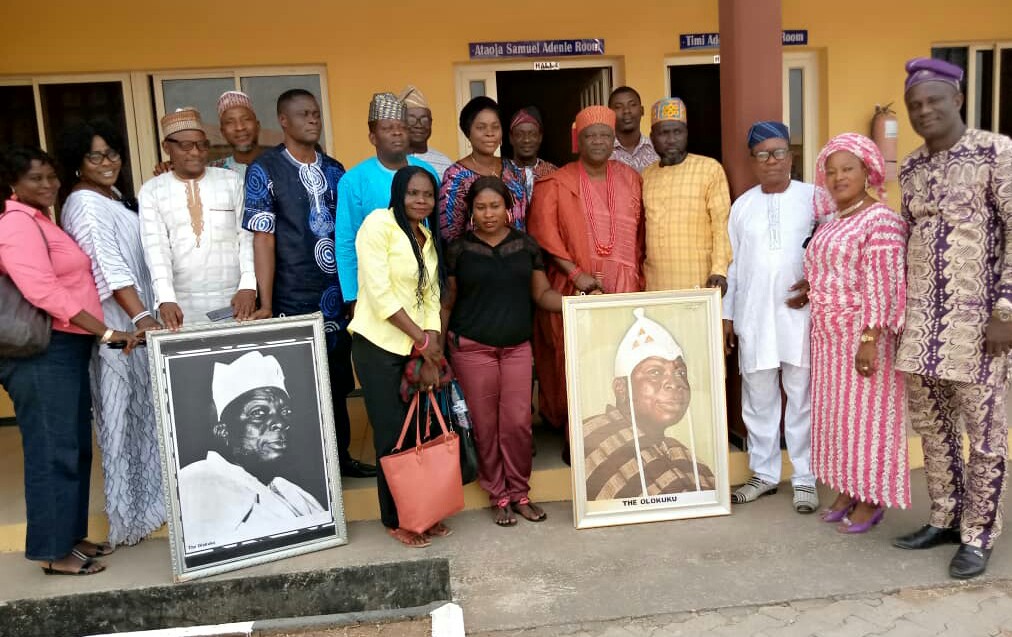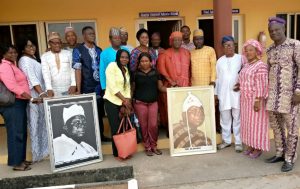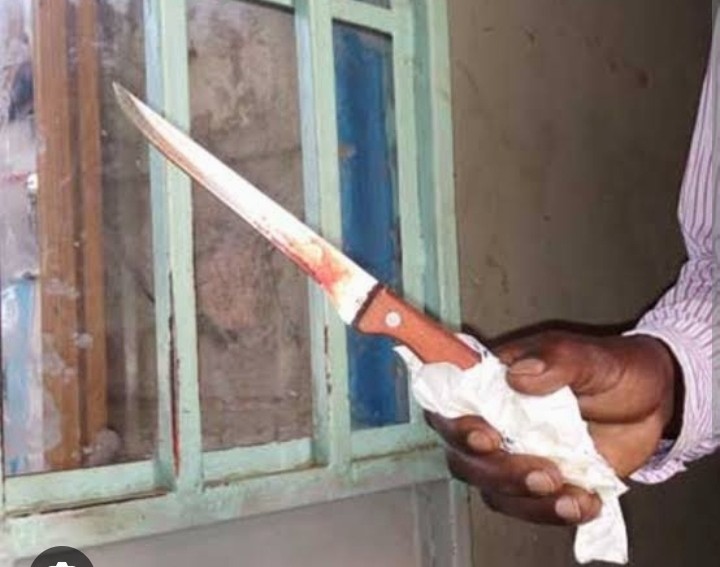Culture
Orangun Oke-Ila, Shiyan Oyeweso, Oluwafunminiyi, Others Refresh 60-year Of Evergreen Memory Of Oba Moses Oyinlola Olokuku Organized By CBCIU

It was a gathering of historians, culture icons and eminent personalities at Center For Black Culture and International Understanding on Monday in Osogbo to mark the iconic life and times of the late monarch, Oba Moses Oyewole Oyinlola, Olokuku of Okuku.
Oba Oyinlola, who reigned not only as the Paramount ruler of Okuku kingdom but walked the greatest path through his exposure within and outside Nigeria to project the town ‘Okuku’ to the world between 1934 – 1960 in Okuku local government of Osun State.
The 60 years of evergreen memory witnessed a talk on the life and times of the late exemplary King of Okuku where CBCIU Research Fellow, Raheem Oluwafunminiyi presented a paper to explain and refresh the memories of participants with the titled “Every Inch A King: Appraising The Life And Times Of Oba Moses Oyinlola Olokuku (1934 – 1960).
In his presentation, Mr Raheem talked about the early life of Oba Oyinlola, how he ascended the throne and his achievement as a king during his reign.
“In the Gold Coast, Oba Moses was said to have served as a house help briefly and then later ventured into trade where he made resounding success and wealth within a decade.
He returned to Okuku in the 1920s, bringing along with him and at the same time introducing the white kolanut popular in the Gold Coast but apparently unknown across Yorubaland.
Moses’ return to Okuku changed the course of farming not only in the town but in most parts of Yorubaland. This kolanut which was soon regarded as Obi Olokuku revolutionised farming in Okuku.
Moses planted this specie of kolanut on his farms located at Odo-Oro and also gave out some to close friends to plant same. Other farmers in neighbouring and distant towns such as Ile-Ife, Ila, Ondo also planted this specie on their farmlands which fetched a lot of economic returns.
Moses did not stop at kolanut farming and trade. He also diversified, going into produce buying and trading in palm kernel and cocoa. His new found wealth made him a source of inspiration for many. He was able to use his wealth for the service of community.
“Early Life (Cont’d) Although non-literate, Moses had positioned himself as one of the new social elites of the period. He dedicated stringent efforts at learning how to read and write in Yoruba to aid him in reading the Yoruba Bible, an effort which greatly helped few years later. In his youth, he was made president of a number of social clubs such as egbe onibata and egbe afurugbin (sowers of the word)”, the researcher said.
Historical, the researcher explained how the late Olokuku ascended the throne, “Oba Oyekunle went to meet with his ancestors on October 27, 1934, paving the way for the selection of a new Olokuku.
In the event of selecting a new Olukuku, the Iwarefa (kingmakers) requested the Edun family to present its candidate via Adedeji who was Moses elder brother and his cousins, Adegboye and Omonije.
The Iwarefa consulted Ifa who picked Moses and according to records, this was agreed on November 1, 1934, while his installation was carried out on November 23, 1934, at Ido-Odu which serves as the ancestral place of installation of all Olokuku.
The installation witnessed a large turnout. While the Alaafin sent a delegation, several Yoruba Obas from near and far graced the occasion.
It was said that the new Olokuku broke with tradition in two key areas: one, he spent three days in seclusion rather than the usual three months traditionally required. Two, he included a Christian Installation Service as part of his installation programme which was held in church presided by one Reverend Babatunde from Otan Aiyegbaju. By this, the reign of Oba Moses Oyewole Oyinlola Edun II began on a good note.”
Part of his achievements were: “Given the trust reposed on him to reign over them, Moses embarked on a reformist agenda that turned around the fortune and future of Okuku for many years to come.
“1. Educational Development. Several primary schools were established in Okuku during his reign among which are: St Michael’s Primary School (1942), St. Anthony’s Roman Catholic Primary School (1944), Oyekunle District Council School (1955), Oyinlola District Council School (1955) among others.
Secured for both Oyekunle and Oyinlola Schools the Western Nigeria Free Primary Education project.
Provided a piece of land to the Anglican Church in Okuku, Ijabe, Ekusa and Iyeku to build the popular United Primary School.
He visited Ibadan severally to seek audience with the colonial authorities on the need for a secondary school in Okuku. In 1960, the final approval was given and Odo-Otin Grammar School was born in Okuku.
One of the lasting legacies of Oba Moses in the area of education was the active role he played in the establishment of the first secondary school in the Osun area.
He convinced several notable Obas such as Oba Samuel Adenle (Ataoja of Osogbo), Oba Adetoyese Laoye (Timi of Ede) and Oba Lawani Adeyemi (Akirun of Ikirun) who pulled their combined resources together and with contributions from well-meaning personalities, Osogbo Grammar School was born in 1951.
“He facilitated the construction and completion of a motorable road between Okuku and Offa. Although communally made and initiated by his predecessor, Oba Moses committed enormous resources to see the project come to fruition.
He was able to secure a radio service and postal agency for the town.”
In their contributions as those who understand much about the reign of the late Olokuku, Professor Siyan Oyeweso who is the Executive Director of Centre For Black Culture and International Understanding, and the Orangun of Oke-Ila Oba Abolarin Adedokun Aroyinkeye both used their historical and royal experiences to schooled and refresh the memories of participants at the programme.
In his royal contribution, Oba Aroyinkeye shared his experience of how he was sobered when they asked him to become the King, bit latter found out that it is from grace to grace.
“Culture is not statics., and history can never be statics but dynamic, Kabiyesi olokuku was part of the first literate monarch.
“In this 21st century, don’t loose hope on monarch, monarchs are intelligent and knowledgeable people. I was inside for 12 calendar months before I was crown as king of Orangun of Oke-Ila. In addition, one of the participant gives encomium to the Oba for keeping record. Oba Abolarin said.
As a professor of history and culture icon, Prof Shiyan Oyeweso also schooled both the researcher and participants on the ironic and exemplary reign of Oyinlola as Olokuku of Okuku. He said “his contribution to the establishment of the Osogbo Grammar School that was Initiated by the Ataoja of Osogbo led to the creation of four houses in 1951 namely Olokuku, Akirun, Ataoja and Timi according to Osogbo Grammar School Website.
“The name was Osogbo United Grammar School before it was later changed to Osogbo Grammar School because of the love for the community.
“The relationship between Ulli Beier and Olokuku brings centre for black culture that is of benefit to all of us today.” Oyeweso added.
-

 Osun News4 days ago
Osun News4 days agoOsun Poly Staff Stabbed During Exam Supervision (Photo)
-

 Osun News4 days ago
Osun News4 days agoBank Manager Arrested By Police In Osun Over Alleged N650.8m Fraud
-

 Osun News1 day ago
Osun News1 day agoFull list of 22 new federal appointees from Osun state emerged
-

 Osun News6 days ago
Osun News6 days agoGov Adeleke Installed As Asiwaju Of Edeland
-

 Metro/Crime1 day ago
Metro/Crime1 day agoPopular Osun Monarch Joins Ancestors
-

 News4 days ago
News4 days agoOyetola’s spokesperson, Omipidan honoured by Kings University
-

 Education5 days ago
Education5 days agoFG Sets to Empower NYSC Members With Millions Of Naira Each
-

 Celebrities3 days ago
Celebrities3 days agoMohbad’s autopsy report presented, reveals cause of his death





